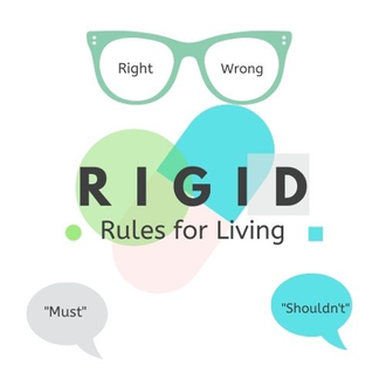|
We all see the world through different lenses. The formation begins in childhood, where we start to work out how to relate to the world, what is right, what is wrong, how to behave and how not to. This is process is one of experience, learning, trial and error, observing, and modelling those around us. It leads to the development of our own set of "rules for living"............. You may not consciously be aware that you have developed these rules, however, they consistently influence how you see, behave, and live your life. Of course, the formation of these rules serves an important purpose; they can act like a guiding compass or code of conduct, some of which we may share with others and some which may be unique to us.
“It is important to drive within the speed limit”, or “everyone deserves respect” are examples of particularly helpful and important rules. Helpful rules are also those that are flexible, amenable to change and permit flexibility in behaviour. Some rules need a little ‘give’ due to the nature of being a human, wherein, having control over everything all the time is not possible. As rules typically come in the format of an instruction about what you can and can’t do, should or shouldn’t do, or the right or wrong way to do something, following them consistently, blindly, or rigidly can lead to inflexible behaviour, behaviour of which can narrow down our options for action. Rigid rules can be easily identified by words such as, should, have to, must, ought, right, wrong, good, bad, always, or never. They may also come in “if…., then…” statements. Consider the following examples and how they may impact your behaviour and how you would feel if you believed them and were required to live up to them daily: “I must always be perfect” “If I let people know the real me, they will think I am a loser” “I must always be the best at everything” “I should never show vulnerability” It is understandable that feelings such as anger, low self-esteem, low mood and anxiety may be related to such rules. Anger is a feeling that is often involved when we feel that important ‘rules’ about how others should behave are violated. To identify some of your rules and assumptions you may like to ask yourself: - What standards do I expect myself to meet? - What do I expect of myself in my various roles? (e.g., child, parent, friend, employee) - What don’t I allow myself to do? - What do I criticise in other people? It is important to note that we all carry rules, helpful and not so helpful ones. Often awareness of our own rigid rules is the most important step in changing how we relate to them and assessing their current usefulness in our life. Therapy can also be a safe place to allow you to assess their advantages and disadvantages and the need for developing new balanced rules or values.
0 Comments
Your comment will be posted after it is approved.
Leave a Reply. |
Categories
All
|

